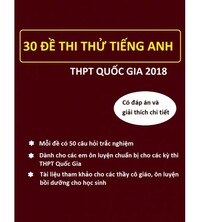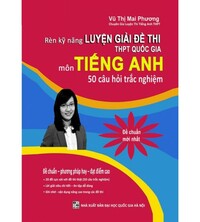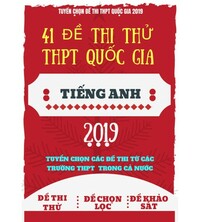Đề thi thử THPT Quốc gia 2018 môn tiếng Anh
Tìm Đáp Án xin gửi đến các bạn Đề thi thử THPT Quốc gia 2018 môn tiếng Anh lần 1 sở GD&ĐT Hải Phòng có đáp án được sưu tầm và đăng tải dưới đây rất hữu ích cho các bạn đánh giá năng lực kiến thức cũng như các kĩ năng cần thiết trước khi bước vào kì thi đại học. Chúc các bạn thành công!
Read the following passage and mark the letter A, B, C, or D on your answer sheet to indicate the correct answer to each of the questions from 1 to 7.
The increase in international business and in foreign investment has created a need for executives with knowledge of foreign language and skills in cross-cultural communication. Americans, however, have not been well trained in either area and, consequently, have not enjoyed the same level in negotiation in an international arena as have their foreign counterparts.
Negotiating is the process of communicating back and forth for the purpose of reaching an agreement. Involves persuasion and compromise, but in order to participate in either one, the negotiators must understand the ways in which people are persuaded and how compromise is reached within the culture of negotiation.
In many international negotiations business abroad, Americans are perceived as wealthy and impersonal. It often appears to the foreign negotiator that Americans represents a large multimillion–dollar corporation that can afford to pay the price without bargaining further. The American negotiator’s role became that of and impersonal purveyor of information and cash, the image that succeeds only in underming the negotiation.
In studies of American negotiators abroad, several traits have been identified that may serve to confirm that stereotypical perception, while subverting the negotiator’s position. Two traits in particular that cause cross-cultural misunderstanding are directness and impatience on that part of Amarican negotiator. Furthermore, American negotiators often insist on realizing short-term goals. Foreign negotiators, on the other hand, may value the relationship established between negotiators and may be willing to invest time in it for long-term benefits. In order to solidify the relationship, they may opt for indirect interactions without regard for the time involved in getting to know the other negotiator.
Clearly, perceptions and differences in values affect the outcomes of negotiation and the success of negotiators. For Americans to play a more effective role in international business negotiations, they must put forth more effort to improve cross-cultural understanding.
Question 1: What’s the author main point?
A. American negotiators need to learn more about other cultures.
B. Negotiation is the process of reaching an agreement.
C. Foreign perceptions of American negotiators are based on stereo types.
D. Foreign languages are important for international business.
Question 2: According to the autor, what is the purpose of negotiation ?
A. To undermine the other negotiator’s position
B. To reach an agreement
C. To communicate back and forth
D. To understand the culture of the negotiators
Question 3: The word “persuaded” in paragraph 2 is closest in meaning to:
A. informed B. respected C. convinced D. accused
Question 4: The word “that” in paragraph 3 refers to:
A. role B. corporation C. price D. bargaining
Question 5: Which of the following is mentioned as a criterion necessary for negotiation?
A. participation B. compromise C. communication D. investment
Question 6: According to the passage, how can the businesspersons improve their negotiation skills?
A. By getting to know the negotiators B. By explaining the goals more clearly
C. By living in a foreign culture D. By compromising more often
Question 7: The American negotiators are described as all of the following EXCEPT:
A. known for direct interactions B. interested in short-term goals
C. willing to invest time in relationships D. perceived by foreign negotiators as wealthy
Mark the letter A, B, C or D on your answer sheet to indicate the word (s) OPPOSITE in meaning to the underlined word (s) in each of the following questions
Question 8: If he gets to university, his parents will be walking on air.
A. disgusted B. promising C. upset D. hopeful
Question 9: She rarely smiles because she’s shy about exposing her crooked teeth.
A. pulling B. hiding C. showing D. brushing
Mark the letter A, B, C, or D to indicate the sentence that best combines each pair of sentences in the following questions.
Question 10: He joined the army in 1998. He was soon after promoted to the rank of captain.
A. He worked as a captain in the army and had a promotion in 1998.
B. Promoted to the rank of captain in 1998, he joined the army soon later.
C. He was promoted to the rank of captain in 1998 and joined the army.
D. Joining the army in 1998, he was soon promoted to the rank of captain.
Question 11: The teacher explained the theory clearly. However, the students found it hard to understand it.
A. Although the teaching theory was clear, there was a real challenge to the students.
B. Despite the teacher clear explanation of the theory, students had difficulty understanding it.
C. In spite of explaining the theory clearly, students themselves found it hard to understand it.
D. Though explained clearly, the theory of teaching was difficult to students.
Mark the letter A, B, C or D on your answer sheet to indicate the most suitable response to complete each of following exchanges.
Question 12: Mike : “Would you mind getting me a cup of coffee?”
Cathy : “_____________”
A. No, I’d be glad to. B. Cream and sugar, please.
C. Yes, I’d love to, thanks D. I never drink coffee.
Question 13: Ms. Janet: “I’d like to try on this dress, please.”
Shop assistant: “_______________”
A. You’re welcome B. By all means C. You’re so nice D. That’s right
Mark the letter A, B, c, or D on your answer sheet to indicate the correct answer to each of the following questions
Question 14: The ballon festival is _____________event that we all desire to attend it.
A. such wonderful an B. so wonderful an C. a very wonderful D. a too wonderful
Question 15: Helping poor people to find a job may help to ___________ crime.
A. refrain B. impose C. prevent D. avoid
Question 16: It’s a pity we didn’t visit Tom when we had the chance. We’d like _______ him before he left the country.
A. to have seen B. to be seen C. to have being seen D. to see
Question 17: Overwork is ________ to cause increased stress.
A. possible B. obvious C. likely D. probable
Question 18: After the interview, don’t neglect the thank-you note or _________ letter.
A. follow-up B. turn-up C. start-up D. break-up
Question 19: A huge farm which belongs to some farmers who share the farming together is called a ________
A. cooperative B. cooperate C. cooperation D. cooperator
Question 20: I’ll send this project to _______ is responsible for designing and building.
A. whatever B. anyone C. whom D. whoever
Đáp án Đề thi thử THPT Quốc gia môn tiếng Anh
| 1-A | 2-B | 3-C | 4-A | 5-B | 6-A | 7-C | 8-C | 9-B | 10-D |
| 11-B | 12-A | 13-A | 14-B | 15-C | 16-A | 17-C | 18-A | 19-C | 20-D |
| 21-C | 22-B | 23-C | 24-D | 25-C | 26-B | 27-D | 28-A | 29-C | 30-C |
| 31-D | 32-C | 33-B | 34-A | 35-C | 36-D | 37-A | 38-D | 39-A | 40-A |
| 41-A | 42-B | 43-B | 44-B | 45-A | 46-D | 47-B | 48-A | 49-A | 50-D |
-----------
Đối với kì thi THPT Quốc gia thì luyện đề là một trong những hoạt động cần thiết và không thể bỏ qua để các bạn có thể tập dượt và đánh giá được khả năng của mình. Bên cạnh đó việc ôn luyện lý thuyết và bài tập theo mảng cụ thể, ví dụ như câu điều kiện, word form, trọng âm, trắc nghiệm ngữ pháp tiếng Anh, trắc nghiệm ..cũng rất hữu ích giúp các bạn đạt điểm cao trong kì thi quan trọng này.







